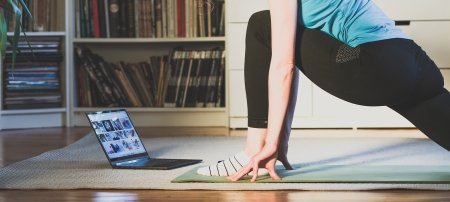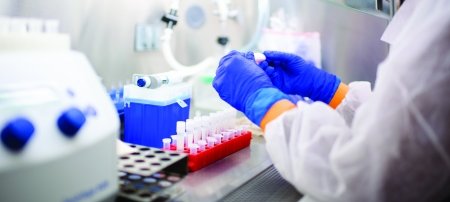Peace Corps Volunteer Tackles a Sensitive Women's Health Problem in Uganda

When Stacey Frankenstein-Markon discovered that girls in Uganda often used rags, old socks or wads of newspapers to do the job of sanitary napkins, she was shocked. She was even more horrified to realize that purchasing commercial pads was an impossible dream for most of them, since they come from families of subsistence farmers making about $1 a day in disposable income.
“Disposable pads cost $1 for an 8-pack,” says the 25-year-old Peace Corps volunteer, who with her husband, Tony Markon, is serving in Uganda as part of Michigan Technological University’s Peace Corps Master’s International (PCMI) program in applied science education. “If a family has three daughters who need pads, that family would have to spend 20 percent of their income just on menstrual pads. Who can afford to do that?”
The pad problem also was leading girls to stay away from school, fearing that they might stain their clothes and be badgered by boys, Frankenstein-Markon said. Eventually, they fall so far behind that they have to drop out.
But thanks to the inventiveness of another Peace Corps volunteer who had served in the eastern Ugandan region just before the Markons got there in 2010, the Michigan Tech student has been able to help hundreds of girls practice better hygiene while they learn about menstruation, their bodies and women’s health. And not incidentally, stay in school.
She is doing it with RUMPS. The RUMPS (Re-Useable Menstrual Pads) project teaches girls to sew locally available toweling into washable pads. Before they start stitching, they learn about puberty, sex, pregnancy and sexually transmitted diseases. The Peace Corps volunteer and her community partners answer questions and encourage honest discussion about matters most of the girls have never considered mentioning in public.
With the help of her three Ugandan partners—Betty Adio, Alice Mundaka and Deborah Nabirye— Frankenstein-Markon has reached more than 1,800 girls, women and men. Adio is now reaching out to another 3,000 elementary school girls. Word is spreading, and seven other Peace Corps volunteers have developed RUMPS projects in their communities.
“I’ve cut out 3,600 RUMPS pads myself,” says Frankenstein-Markon. “I have spent 180 hours using scissors, bandaged six blisters and swept up more tiny bits of towel fluff than I ever imagined could exist.”
In October 2010, two Michigan Tech faculty members visited the Markons and the RUMPS project. Brad Baltensperger, chair of the Department of Cognitive and Learning Sciences at Michigan Tech and program director of the PCMI Applied Science Education Program, and Casey Huckins, an associate professor of biological sciences who heads the University’s new PCMI in biological sciences, spent a week in Uganda to discuss the graduate students’ research, to observe them teaching and to learn more about the experiences of Peace Corps volunteers.
“Stacey made a rousing presentation about women's bodies and menstrual health to several hundred high school girls packed into a large classroom,” Baltensperger says “She was animated and direct, and she used innovative ways to get and maintain the attention of her audience. “
One of Baltensperger’s and Huckins’ fondest memories of their African trip is sitting around a pot of warm millet beer with several teachers at the end of the day. “Casey and I both joined in drinking from the communal container through 3-foot long straws and talked about the challenges faced by teachers in Uganda,” Baltensperger recalls.
Frankenstein-Markon’s work has not gone unrecognized. For International Women’s Day earlier this month, the Peace Corps in Uganda nominated her for her efforts to “empower girls.” She was one of three winners from Africa recognized by the Peace Corps worldwide.
How do Ugandans respond to Americans broaching such a sensitive subject? “Overall, every community I have visited has reacted positively,” Frankenstein-Markon says. “In Uganda today, people are trying to overcome traditional taboos. I have found that talking about menstrual health has opened the door for other, deeper topics. I start by talking about body changes. Then I move on to how a woman becomes pregnant.”
Sometimes the question-and-answer component of RUMPS sessions does run into cultural roadblocks. She recalls one man saying, “Madam, how can I ask you about sex when my niece is in the audience?” Also, “most Ugandans do not want their children to hear about family planning,” Frankenstein-Markon says.
But she is far from discouraged. “For every five shy Ugandans, there is always one courageous woman who says, “Ladies, let’s talk about the clitoris,” another who asks, ‘Madam, I want to use family planning. What can I do?’ People want this information, and we can help them get it.”
A biological sciences major who earned her Bachelor of Science from Michigan Tech in 2008, Frankenstein-Markon heard about PCMI when she was a junior. When she learned that PCMI was about to start a program in applied science education, she had no doubts. “To be able to join the Peace Corps while earning a master’s degree was a no-brainer,” she says. “It is such a unique opportunity and environment to do your research.”
Next fall, the Markons will be back at Michigan Tech to complete their master’s degree work. And then? “We may end up abroad again,” she says. Judging by her passion for her efforts in Uganda that would be no surprise.
Michigan Technological University is an R1 public research university founded in 1885 in Houghton, and is home to nearly 7,500 students from more than 60 countries around the world. Consistently ranked among the best universities in the country for return on investment, Michigan's flagship technological university offers more than 185 undergraduate and graduate degree programs in science and technology, engineering, computing, forestry, business, health professions, humanities, mathematics, social sciences, and the arts. The rural campus is situated just miles from Lake Superior in Michigan's Upper Peninsula, offering year-round opportunities for outdoor adventure.




Comments